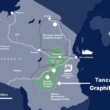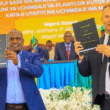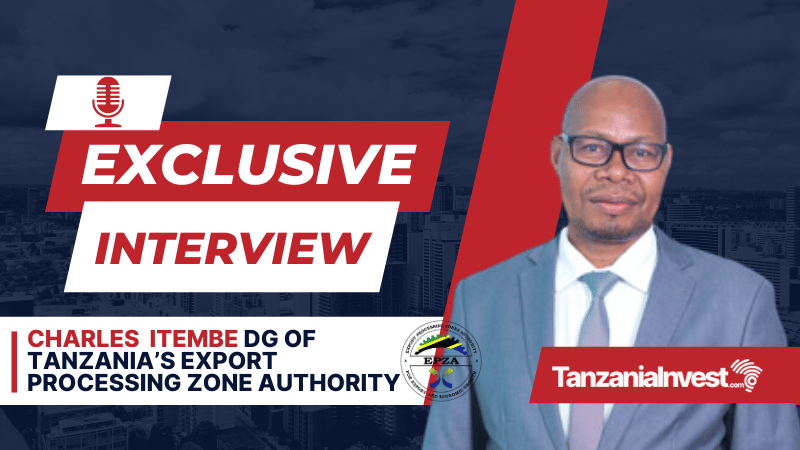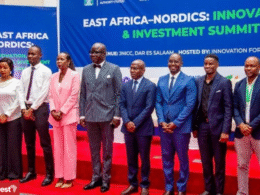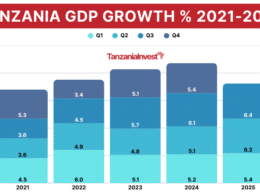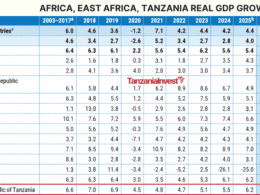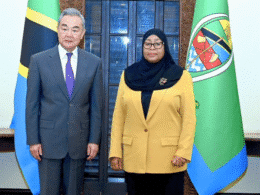In this exclusive interview, Mr. Charles Jackson Itembe, Director General of the Export Processing Zone Authority (EPZA), discusses the agency’s strategic goals, the evolving business environment, and compelling incentives for potential investors.
Mr. Itembe sheds light on innovative initiatives like the Business Facilitation Portal and explores the dynamics of capital market engagement for SEZ infrastructure development.
Can you provide an overview of EPZA’s role in investor acquisition and notable opportunities available for the taking?
EPZA operates as an autonomous government institution, playing a pivotal role in facilitating investor acquisition. Our primary focus is on providing robust support mechanisms, ensuring streamlined processes, investor licensing, and observing good governance during execution.
Our purpose is to attract foreign investors and encourage domestic investors, attract capital, generate employment, earn foreign exchange, promote technology transfer, and create productive linkages benefiting the broader economy.
Our purpose is to attract foreign investors and encourage domestic investors, attract capital, generate employment, earn foreign exchange, promote technology transfer, and create productive linkages benefiting the broader economy.
For this, EPZA manages two distinctive schemes—the Special Economic Zone (SEZ) and the Export Processing Zone (EPZ). The SEZ scheme promotes domestic manufacturing, while the EPZ scheme promotes export-led manufacturing. We believe in industrialization as a catalyst for economic development.
We appreciate the current setup of the National Planning Commission under the President’s Office, Planning and Investments which looks at issues holistically to guide all ministries, creating coordination and oversight.
We currently prioritize export-oriented investors to address foreign currency shortages caused by global dynamics. The incentives we offer through our schemes are quite attractive for new investors.
We currently prioritize export-oriented investors to address foreign currency shortages caused by global dynamics. We provides a comprehensive package of tax holidays, duty exemptions, streamlined customs procedures, and ready-built infrastructure.
EPZA provides a comprehensive package of tax holidays, duty exemptions, streamlined customs procedures, ready-built infrastructure, and guarantees to facilitate export-oriented manufacturing investment in Tanzania.
The Bagamoyo SEZ (BSEZ), with its completed Master Plan and feasibility study, presents a significant investment opportunity connecting the port, industry, services, commercial and residential. BSEZ will be a comprehensive industrial city.
Our objective is to promote export-led manufacturing, and Bagamoyo, with its planned port, serves as a prime location to attract investors looking to contribute to the country’s economic growth.
The Bagamoyo Special Economic Zone presents a significant investment opportunity connecting the port, industry, services, commercial and residential.
We are in the process of advertising and conducting roadshows globally to engage with potential investors.
You recently introduced a Business Facilitation Portal. Can you share insights into its development and the expected benefits for investors?
The Business Facilitation Portal is a transformative initiative aimed at modernizing and simplifying investors’ application processes.
This platform is designed to revolutionize how investors apply, allowing for digital remote applications and licensing without needing to visit Tanzania. Payments can also be completed online and also operationally connecting our institution to the board and other stakeholders to streamline approvals.
We anticipate going live by December 2023, after final security checks. The portal will significantly cut costs and time for investors and enhance overall efficiency.
You also initiated conversations with the Dar es Salaam Stock Exchange (DSE) for capital market engagement. Can you tell us more about this initiative?
Our exploration of capital market engagement is strategic and aligns with the goal of raising capital for infrastructure projects. The DSE presents an opportunity to tap into substantial capital for development since there is strong retail demand, but limited products available.
The DSE presents an opportunity to tap into substantial capital for development since there is strong retail demand, but limited products available.
We are identifying areas, such as industrial real estate, where private sector involvement can yield significant returns.
While still in the planning stages, this initiative is a step towards sustainable development and fostering collaboration between the public and private sectors through Alternative Project Financing Options(APF) which is currently highly encouraged by the Ministry of Finance.
How would you describe the current business environment in Tanzania, and what challenges do potential investors typically face? What measures has the government taken to enhance it?
The current business environment in Tanzania has undergone significant improvements. A strategic blueprint has been instrumental in shaping a more attractive business landscape addressing the cost of doing business, and streamlining legal and procedural red tape and bureaucracies.
One predominant challenge faced by potential investors is the lack of industrial infrastructure to accommodate their operations swiftly.
The current business environment in Tanzania has undergone significant improvements. A strategic blueprint has been instrumental in addressing the cost of doing business, and streamlining legal and procedural red tape and bureaucracies.
Efficient infrastructure in terms of industrial utilities provided within a serviced land is fundamental for attracting and retaining serious investors but again shortens the time spent for the establishment of factories.
Recognizing that infrastructure is a capital-intensive investment, EPZA is actively addressing this concern with Government support, and we are committed to making strategic investments in this area especially inviting capable local and foreign investors to establish SEZs with serviced land.
The government’s ongoing significant investments in energy infrastructure and Standard Railway Gauge have been crucial, addressing a component vital for industrialization.
The government’s ongoing significant investments in energy infrastructure and Standard Railway Gauge (SGR) have been crucial, addressing a component vital for industrialization.
To conclude, what would be your message to potential investors considering Tanzania?
Tanzania stands as a stable and strategically located destination for investors. The business environment is continually improving, with EPZA and the Tanzania Investment Centre (TIC) providing attractive incentives to encourage investment.
The country’s commitment to infrastructure development and enhanced business structures position Tanzania as an ideal investment choice.
Furthermore, our participation in the East African Community (EAC), the African Continental Free Trade Area (AfCTFA), as well as the Southern African Development Community (SADC) also expands access to regional markets.
Our strategic location, ongoing reforms, and abundance of raw materials present tremendous opportunities for export-oriented manufacturing and value-added processing in an array of sectors.
Our strategic location, ongoing reforms, and abundance of raw materials including the availability of critical minerals (lithium, nickel, cobalt, and rare earth elements) in Tanzania present tremendous opportunities for export-oriented manufacturing and value-added processing in an array of sectors.




